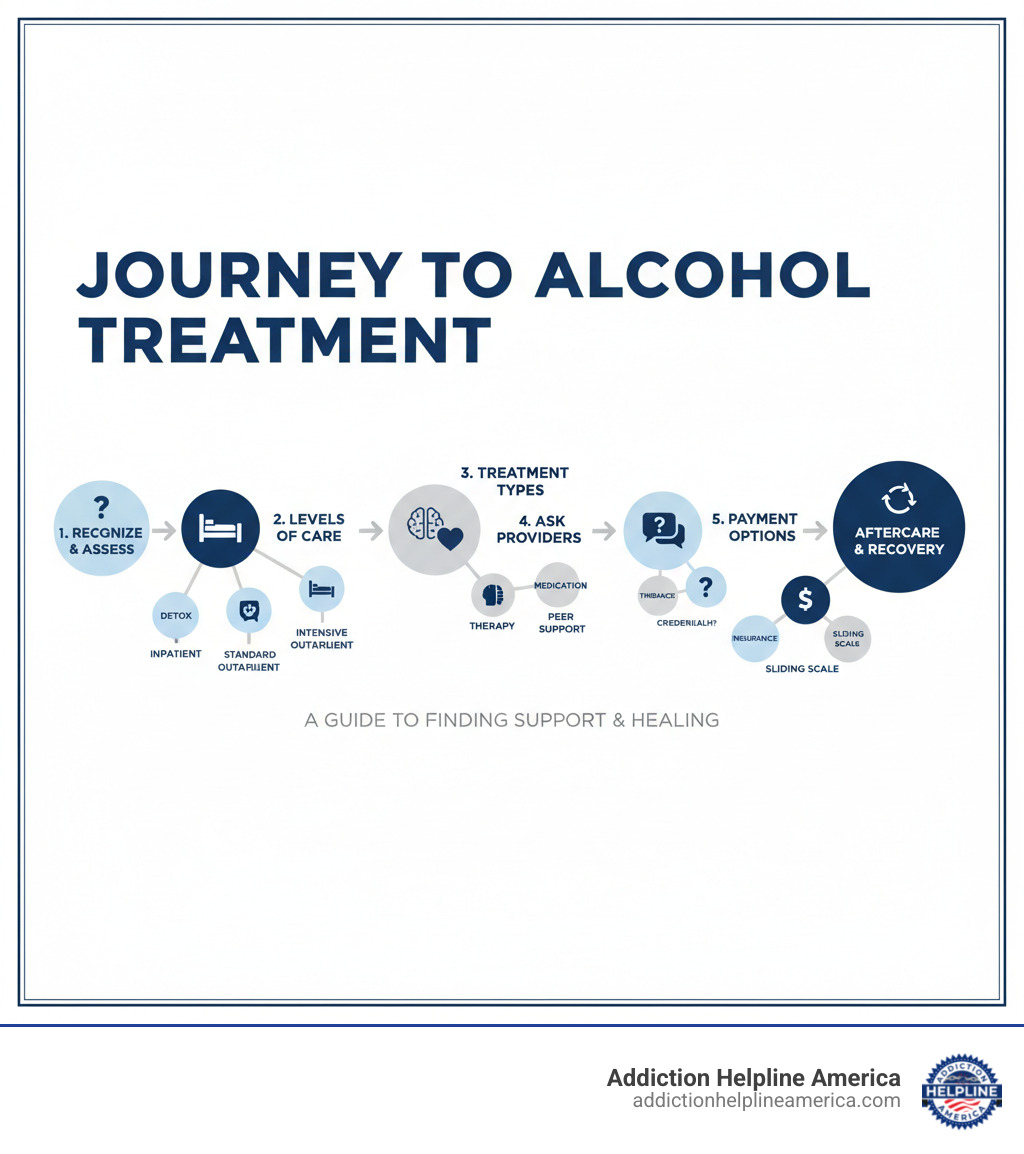
Why Finding the Right Alcohol Treatment Can Save Your Life
Find alcohol treatment that works for you by following these essential steps:
- Understand your needs by assessing the severity of your alcohol use.
- Explore treatment levels, from medical detox and inpatient rehab to outpatient care.
- Use trusted resources like SAMHSA’s FindTreatment.gov or call helplines for referrals (1-800-662-HELP).
- Ask key questions about licensing, treatment methods, and insurance.
- Consider all options, including telehealth, medication, and peer support.
Millions of Americans struggle with alcohol use disorder, a treatable medical condition. More options exist today than ever before, from medications that reduce cravings to therapies that help you rebuild your life. The path to recovery is different for everyone; some need 24-hour medical care, while others thrive with outpatient counseling. The most important thing is taking the first step.
At Addiction Helpline America, we’ve helped thousands find alcohol treatment that meets their unique needs. We offer free, confidential guidance to connect you with quality, evidence-based care nationwide. We’re here to simplify the process and support you every step of the way.

Find alcohol treatment terms you need:
Understanding Alcohol Use Disorder (AUD) Before Seeking Treatment
It’s crucial to know that alcohol use disorder (AUD) is a medical condition, not a character flaw or sign of weakness. AUD is a chronic brain disorder that makes it difficult to control your drinking, even when it causes problems. Like other medical conditions, it responds to proper treatment and care.
The signs of AUD exist on a spectrum. Symptoms include drinking more than intended, trying to cut back without success, or continuing to drink despite negative effects on your job, relationships, or health. Needing more alcohol for the same effect (tolerance) or feeling shaky when you stop (withdrawal) are also key signs.
Professionals assess AUD severity based on the number of symptoms over 12 months: two to three symptoms indicate mild AUD, four to five mean moderate AUD, and six or more suggest severe AUD. No matter the severity, treatment can help. You don’t need to wait for a crisis to find alcohol treatment.
The stigma around addiction often prevents people from seeking help by creating shame and isolation. However, understanding AUD as a treatable brain disorder helps lift that shame. This perspective shift is often the first step toward healing. For more on this topic, see this video on Stigma and Mental Health.
Recovery is possible. Recognizing AUD as a medical condition that responds to evidence-based treatment is key to starting your journey.
Call Now – Your Journey to Recovery Begins Today!

Take the first step towards a healthier life! Call now to connect with our compassionate team and start your recovery journey today. Your path to healing awaits!
Our recovery specialists are available 24/7 to provide support, and all calls are confidential and free. Reach out anytime – we’re here to help!

Exploring the Landscape of Alcohol Treatment Options
There is no single magic formula for treating alcohol use disorder. The most effective approach is personalized care that considers your unique situation, goals, and responsibilities. Today’s treatment landscape offers more choices than ever, nearly all grounded in evidence-based treatment—methods backed by research showing they work.
Professionals use a continuum of care, a spectrum of support from intensive, 24/7 medical supervision to flexible weekly check-ins. As your needs change, you can move along this continuum, ensuring you always have the right level of support. Our Guide: Treatment for Alcohol Problems walks you through this in detail.

Levels of Care: From Inpatient to Outpatient
Let’s break down the different levels of care available.
Medical detoxification (detox) is often the first step for moderate to severe AUD. Suddenly stopping alcohol can cause dangerous withdrawal symptoms, so detox provides 24-hour medical supervision to keep you safe and comfortable.
Inpatient or residential treatment involves living at a facility for 30, 60, or 90 days. This structured, trigger-free environment is ideal if you have a severe AUD, co-occurring mental health conditions, or an unstable home life.
Partial Hospitalization Programs (PHP) offer intensive day treatment (around 20 hours per week) while you return home at night. It’s a good balance for those needing substantial support but who have a safe home environment.
Intensive Outpatient Programs (IOP) are less intensive, with about nine hours of structured sessions per week. This allows you to maintain work, school, or family duties. Learn more in our guide on Outpatient Addiction Treatment Programs.
Standard outpatient treatment is the most flexible option, involving regular therapy sessions (e.g., once or twice a week) while you live at home. It works well for mild AUD or as ongoing support.
Here’s a quick comparison:
| Feature | Inpatient/Residential Treatment | Outpatient Treatment (IOP/PHP included) |
|---|---|---|
| Intensity | High (24/7 supervision, highly structured) | Moderate to low (scheduled sessions, live at home) |
| Duration | Typically 30, 60, or 90 days, sometimes longer | Varies widely, from weeks to months or even years |
| Cost | Generally higher due to room, board, and round-the-clock care | Generally lower, as it doesn’t include living expenses |
| Ideal Candidate | Severe AUD, co-occurring disorders, unstable home, need for detox | Mild/moderate AUD, stable home, desire to maintain daily life |
Therapeutic Approaches: Evidence-Based Behavioral Therapies
Behavioral therapies are the core of recovery, helping you understand why you drink and develop healthier coping strategies.

- Cognitive-Behavioral Therapy (CBT) teaches you to recognize and change the thought patterns and behaviors that lead to drinking.
- Motivational Interviewing helps you resolve ambivalence about quitting by strengthening your own motivation for change.
- 12-Step Facilitation Therapy introduces the principles of programs like Alcoholics Anonymous to help you engage with these supportive communities.
- Family and couples counseling repairs relationships and teaches loved ones how to support your recovery effectively.
Many centers also offer holistic therapies (yoga, meditation, art therapy) and integrated treatment for co-occurring disorders like depression or anxiety, addressing both issues simultaneously for a better outcome.
Medical Support: Medications for Alcohol Use Disorder
Medications can be a powerful tool in treating AUD. They are not addictive and work by rebalancing brain chemistry to reduce cravings and ease withdrawal, helping you focus on recovery.
Three FDA-approved medications for AUD are:
- Naltrexone: Reduces cravings and blocks the pleasurable effects of alcohol. Available as a daily pill or monthly injection.
- Acamprosate: Eases withdrawal symptoms like anxiety and restlessness, making early recovery more manageable.
- Disulfiram: Acts as a deterrent by causing unpleasant physical reactions (like nausea) if you drink alcohol.
These medications support your brain’s healing process, increasing your chances of success when combined with therapy. Medication-assisted treatment is also effective for other issues, such as those discussed on our page about Suboxone for Opioid Addiction.
Call Now – Your Journey to Recovery Begins Today!

Take the first step towards a healthier life! Call now to connect with our compassionate team and start your recovery journey today. Your path to healing awaits!
Our recovery specialists are available 24/7 to provide support, and all calls are confidential and free. Reach out anytime – we’re here to help!
How to Find Alcohol Treatment That’s Right for You
Finding alcohol treatment that fits isn’t about picking the first program you see; it’s about understanding yourself first. An honest assessment of your alcohol use severity, co-occurring mental health issues, and recovery goals is the foundation for finding care that will work.

Your individual needs determine the right level of care. Someone with severe AUD may need inpatient treatment, while another person might thrive in an outpatient program. This assessment isn’t something you have to do alone; professional guidance is key. Our guide on How to Get Into Rehab walks you through this initial step.
Step 1: Using Trusted Resources to Find Alcohol Treatment
Searching for treatment can be overwhelming. At Addiction Helpline America, we offer free, confidential guidance to connect you with quality, evidence-based care from our nationwide network. We can also provide information on Find State Funded Substance Use Programs, which are a lifeline for many.
Other national resources include:
- SAMHSA’s FindTreatment.gov: A confidential tool to search for facilities by location, services, and payment options.
- NIAAA Alcohol Treatment Navigator: A step-by-step guide to finding quality care.
- Helplines: Call or text 988 for crisis support or call SAMHSA’s National Helpline at 1-800-662-HELP (4357) for treatment referrals.
Step 2: Key Questions to Ask When You Find Alcohol Treatment Providers
Once you have a shortlist of providers, ask critical questions to ensure they offer quality care.
- Licensing and Staff: Is the program licensed and accredited? What are the qualifications of the clinical staff?
- Treatment Approach: Do they create individualized treatment plans? What evidence-based therapies (like CBT or Motivational Interviewing) do they use?
- Co-occurring Disorders: Do they offer integrated treatment for mental health conditions like depression or anxiety?
- Success and Relapse: How do they measure success? How is relapse handled?
- Aftercare: What kind of aftercare planning and support is provided to ensure long-term recovery?
These questions will help you gauge a program’s quality beyond its marketing. For more insights, see our Treatment Center Reviews page.
Step 3: Navigating Costs and Insurance Coverage
Cost should not be a barrier to treatment. Coverage for substance use services has improved significantly.
- Private Insurance: Most plans cover some portion of treatment. Call your provider to understand your specific coverage, deductibles, and co-pays.
- Medicare & Medicaid: Medicare Part A covers inpatient services, Part B covers outpatient care, and Part D covers medications. Medicaid coverage varies by state but generally includes a wide range of services. Contact your State Medical Assistance (Medicaid) office for details.
- Other Options: If you’re uninsured or underinsured, many centers offer sliding scale fees based on income or financing options. Free treatment options also exist through state-funded and non-profit programs. Our Free Addiction Treatment guide explores these possibilities.
Call Now – Your Journey to Recovery Begins Today!

Take the first step towards a healthier life! Call now to connect with our compassionate team and start your recovery journey today. Your path to healing awaits!
Our recovery specialists are available 24/7 to provide support, and all calls are confidential and free. Reach out anytime – we’re here to help!
The Rise of Modern and Specialized Treatment Solutions
The world of alcohol treatment has evolved, making help more accessible and personalized than ever. When you find alcohol treatment today, you’ll find innovative options that didn’t exist a decade ago, designed to fit your unique life and circumstances.
This shift toward specialized care means you have a better chance of finding a program that truly resonates. Let’s explore some of these modern solutions.

Is Virtual Alcohol Rehab Effective?
Virtual alcohol rehab, or telehealth, has become a game-changer, offering effective treatment from the comfort of your home. Research shows it is a viable option for many, especially for outpatient levels of care.
Through secure video platforms, you can attend individual and group therapy, meet with medical providers, and access educational resources. The benefits include improved privacy, convenience, and accessibility for those in rural areas, with mobility issues, or with demanding schedules.
Virtual treatment is not for everyone—those needing medical detox or 24/7 supervision still require inpatient care. But for many with mild to moderate AUD and a stable home, it can be just as effective as in-person treatment. Learn more in our Virtual Alcohol Rehab: Complete Guide.
Specialized Treatment Programs for Diverse Needs
Modern treatment recognizes that different groups face unique challenges and deserve custom care.
- Adolescents and young adults need developmentally appropriate programs that involve family and address school pressures. See our page on NIAAA Facts About Teen Drinking.
- Veterans benefit from programs that understand military culture and address combat trauma, PTSD, and other service-related issues. Our Veterans Substance Use Support resource has more information.
- Gender-specific programs for men or women can create a safer space to discuss sensitive topics like trauma, motherhood, or masculinity.
- LGBTQ+ affirming care provides a culturally competent, non-judgmental environment where identity is respected and understood.
- Executive and professional programs offer privacy and flexibility, allowing clients to address career-specific pressures while maintaining work responsibilities.
Finding a specialized program means you don’t have to fit into a generic model; you can find care designed for you.
Life After Treatment: Building a Foundation for Lasting Recovery
Finishing a treatment program is a major achievement, but recovery is a journey, not a destination. Like any chronic health condition, AUD requires ongoing attention to maintain well-being. Your initial treatment builds the foundation; aftercare helps you maintain it.
Aftercare planning is a critical roadmap for transitioning back to everyday life. It may include ongoing therapy, support groups, or medication management. Many people benefit from sober living homes, which provide a safe, substance-free environment to practice recovery skills with peer support.
Peer support groups are a powerful tool. Alcoholics Anonymous (AA) offers a 12-step spiritual framework, while SMART Recovery uses a science-based, secular approach. Both are free, widely available, and have helped millions maintain sobriety.
It’s also important to know how to handle relapse. A setback does not mean failure or erase your progress. AUD is a chronic condition, and sometimes the treatment approach needs adjustment. If a relapse occurs, reach out to your support system, reconnect with your provider, and use the experience as a learning opportunity to strengthen your recovery plan.
With the right tools and support, a fulfilling life in recovery is possible. For a deeper dive, explore our Addiction Recovery: Complete Guide.
Frequently Asked Questions About Alcohol Treatment
We hear from thousands of people searching for answers about alcohol treatment. Here are some of the most common questions.
How do I know if I or a loved one needs alcohol treatment?
If you’re asking the question, it’s a sign that something may be wrong. If you or a loved one shows two or more signs of AUD—like drinking more than planned, having cravings, or continuing to drink despite negative consequences—it’s time to seek help. Other signs include an inability to cut back or drinking to cope with stress. The most reliable way to know for sure is to get a professional evaluation from a doctor or addiction specialist.
How long does alcohol rehab usually last?
The length of treatment varies based on individual needs. There is no one-size-fits-all duration.
- Medical detox typically lasts from a few days to two weeks.
- Inpatient programs commonly run for 30, 60, or 90 days, with longer stays often leading to better outcomes.
- Outpatient programs can last from several weeks to months, offering more flexibility.
Many people benefit from a continuum of care, starting with intensive treatment and stepping down to ongoing support like therapy or support groups, which can continue for months or years.
What is the success rate for alcohol treatment?
While no program can guarantee a specific outcome, treatment for AUD is highly effective, and recovery is absolutely possible. Success can be defined as complete abstinence or a significant reduction in drinking and its related harms.
Several factors influence success, including:
- Your motivation and active participation.
- Finding the right treatment match for your needs.
- Addressing any co-occurring mental health disorders.
- Having a strong support system.
- Engaging in long-term aftercare.
A relapse doesn’t mean treatment failed; it may just mean the strategy needs to be adjusted. For more details, read our guide on Addiction Treatment Success Rates. The bottom line is that treatment works when people engage with it and receive the right level of care.
Call Now – Your Journey to Recovery Begins Today!

Take the first step towards a healthier life! Call now to connect with our compassionate team and start your recovery journey today. Your path to healing awaits!
Our recovery specialists are available 24/7 to provide support, and all calls are confidential and free. Reach out anytime – we’re here to help!
Your Next Step to a Healthier Future
If you’ve read this far, you’ve already taken a courageous step. Recovery is not just a hopeful phrase—it’s a reality for millions who once stood where you are now. You don’t need all the answers to begin; you just need to take the first step.
At Addiction Helpline America, we understand how overwhelming it can be to find alcohol treatment. That’s why we’re here. We offer free, confidential, and personalized guidance to connect you with quality, evidence-based programs from our nationwide network. We’ll listen to your story and help you explore options that fit your unique needs, whether it’s detox, inpatient care, or outpatient therapy.
Hope and support are waiting. You deserve a healthier future, and we’re here to help you reach it. Explore Different Types of Treatment Programs or call us today to take the first step together.
Our helpline is 100%
free & confidential
If you or someone you care about is struggling with drug or alcohol addiction, we can help you explore your recovery options. Don’t face this challenge alone—seek support from us.
Confidential Alcohol Treatment Support and Guidance
Resources
Will my insurance
cover addiction
treatment?
We're ready to help
Find the best
drug or alcohol treatment
center
Are you or a loved one struggling with addiction? Call today to speak to a treatment expert.















